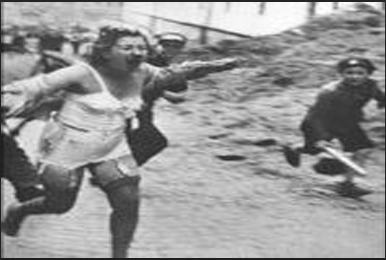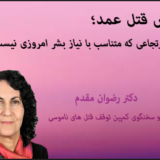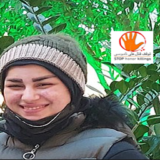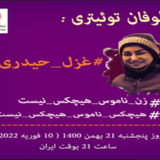A quick respond to some legal questions viewers might ask about the law and “honour” killings in Iran
- What kind of law do we need to stop “honour” killings? Do we need a specific legislation to address Honour Based Violence ?
Yes, it appears that we would need a specific legislation to tackle the honour based crime and honour killings in Iran. Apparently, the general Code approach has failed to address the specific aspects of the honour based violence. Therefore we would need a specific legislation to rely on and take an effective action to eradicate the crime. For examples, many states have legislation on domestic violence in order to deal with such specific offence with a wider approach. The honour killings an effective law should be introduced to prevent the honour based violence and abuse from escalating and tackle high-rates of re-victimisation of women and girls in the Iranian society. In the meantime, the punishment as a response to this crime should be proportional to the offence.
- If we have special legislation in relation to the “honor” killings, can we expect that it would prevent this offence?
The law would have little impact on prevention of the crime in the absence of education and conscious raising of the society and the change in the culture within which the “honor” killings are committed.
There must be coordination between the judiciary and law enforcement bodies with specific designated budget for training of the police and other relevant organisations, even inclusion in the school curriculum. The law enforcement bodies must be trained to recognise those vulnerable women and girls in danger and act promptly to save lives. The government must provide safe homes in every city and town and have trained social workers to be at hand to help the victims.
In the end, the specific legislation should impose an aggregate punishment for the perpetrator (which is often the father or other male family member) What is meant by special punishment in “honor” killing crimes? Is it a viable solution to commit the father to Ghesas (to execute him) in preventing the crime?
“Ghesas” which means killing another person is not accepted by human rights defenders. However, it is not acceptable that under the Iranian existing law, the honour based criminals, (who is often the father and male family members) are disproportionately subject to short prison sentences., The act of a father killing his daughter, where he has parental duty of care toward her is a horrendous crime and must receive aggregate sentence instead of disproportionally reducing the punishment for such offender. An appropriate legislation in this respecthis will serve a dual purpose both on the prevention of the crime and brings social awareness.
- When a law is not just, how do we expect a judge to justly deal with the crime?
A just law will bring about just rulings. But one cannot ignore the role of the judges who deal with women and girls under threat or when they have been murdered. Judges do not issue maximum sentence to the murderer and that gives a green light to other male family members to murder their women folks.
Another common factor in such crimes is the impassivity of the police and the judges to take the danger seriously which sometimes has a negative impact in the process of a murder. For example, if a woman is caught having relations outside the marriage, her private relationship is considered a crime. In such cases if she returns to the family, she is in greater danger by members of her family who might punish her to preserve their “honor”.
- How come the brothers or cousins or other male family members who have committed the murder do not receive maximum punishment which is “Ghesas”?
The first issue is the unequal punishment in cases of the murder of men and women. The life of a woman is worth half the value of a man. In cases of the murder of a woman, if the family pays half of the “Dieh” or “Blood” money (which they often cannot afford), then the murderer will receive the “Ghesas”. In a number of cases, the immediate family of the victim are under pressure from other family members to withdraw their claim and so the murderer (s) is released after a light sentence. Murders within the family are categorised as a family matter and outside the common crime and resulting to occur in another household.
- What is the relevance of article 220 of Islamic penal code with the “honor” killings and what is the difference between this article with articles 301 and 302?
Article 220 of the Islamic penal code refers to the Islamic penal code approved in 1370 which says:
“if the father or grandfather murders a child, he will not receive the “Ghesas”. Rather, he has to pay “dieh” to the family of the murdered child (often the mother).
Artcicle 301 of the Islamic penal code rewrites article 220 replacing the “grandfather” to “grandfathers”.
According to both these articles, the father or the grandfather will be exempt from punishment.
Article 302 refers to the crime of infidelity. If a man sees his wife in bed with another man, he has the right to kill her. In other words, he is granted the right to execute another human being with impunity.
The unjust laws and the attitude of the law enforcement agencies often provide grounds for such crimes to continue.














